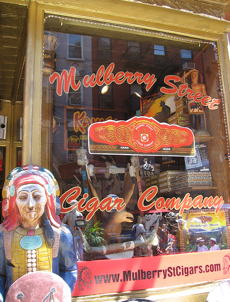Stogie Commentary: What Will the Future Bring?
9 Jul 2008
With the IPCPR Las Vegas convention on the horizon, it’s natural to think about new cigar releases and company announcements (which Patrick S will be detailing tomorrow). I’m afraid, however, I can’t help but look to the future with a little trepidation.
 In recent years, we’ve been blessed with many great cigars, the emergence of top-tier blenders, and some extraordinary limited edition smokes. But we’ve also begun to experience inconsistency, brand proliferation that seems to defy common sense, and lots of just plain duds.
In recent years, we’ve been blessed with many great cigars, the emergence of top-tier blenders, and some extraordinary limited edition smokes. But we’ve also begun to experience inconsistency, brand proliferation that seems to defy common sense, and lots of just plain duds.
It’s hard not to wonder if all the growth has, once again, pushed the need for the high-quality, well-aged tobacco that’s necessary for excellent cigars beyond availability. I know growers have expanded quite a bit in recent years, with Nicaragua probably the most notable example. And just think of the countries you often hear about now that were virtually non-starters in the production of cigar tobacco just a few years ago: Costa Rica, Colombia, Peru, Italy…
But growing tobacco isn’t the same as growing good tobacco. (I’ve had a couple of cigar makers tell me that it’s extremely easy to get tobacco these days, but competition for high-quality leaf is tougher than it’s ever been.) Then there are the requirements for aging and curing, processes that can’t be hurried without harming the outcome.
Consistency is also a critical factor for cigars. Smokers expect their sticks, with a few exceptions, to taste and perform more or less the same from box to box, year to year. It isn’t really like wine or high-end coffee, where the grapes and beans—and the results—are evaluated crop by crop. The demand for cigar repetition is more akin to liquor. In addition to a cigar’s taste, we expect to experience the same quality construction, draw, application of the cap, burn, etc., each time we light up.
When you consider all these factors—and look at the endless number of new cigars hitting the market—I think it’s hard not to feel some pessimism.
While it is possible, of course, to create an almost infinite number of blends, I don’t believe it’s possible to make so many consistently and to also make them good and distinctive as well. Consequently, I think we’ve all had the unpleasant experience of finding a new cigar that’s terrific, only to be roundly disappointed when you then bought a box. Or when you tried others by the same blender or manufacturer with poor results.
So, though I’m eager to learn about new cigars unveiled at IPCPR, I hope at least some of those in the industry will address the vital underlying issues of quality and consistency. That could give cigar smokers at least a little glance into what lies ahead.

 Data seems to support the anecdotal evidence. Imports of premium sticks appear to be down this year from pretty impressive levels in 2007, according to the always authoritative
Data seems to support the anecdotal evidence. Imports of premium sticks appear to be down this year from pretty impressive levels in 2007, according to the always authoritative  You see, cigars are usually smoked in their New York offices. They say they make a point of always smoking their cigars in the same place to ensure that the environment isn’t affecting the ratings.
You see, cigars are usually smoked in their New York offices. They say they make a point of always smoking their cigars in the same place to ensure that the environment isn’t affecting the ratings. The second, by Jane Brody in the
The second, by Jane Brody in the  Since all tobacco products are already illegal for anyone under the age of 18, the ban is simply an elitist attempt to target cheap cigars that are mostly smoked by young inner-city adults (who city officials seem to think are too stupid to be able to decide whether to smoke cigars). Or, as Jacob Grier
Since all tobacco products are already illegal for anyone under the age of 18, the ban is simply an elitist attempt to target cheap cigars that are mostly smoked by young inner-city adults (who city officials seem to think are too stupid to be able to decide whether to smoke cigars). Or, as Jacob Grier  If you win cigars this week, donate them. If you’re planning to send a bomb to a friend or cigar board acquaintance, give the cigars to service men and women instead. If you receive a bomb, pass it along to the men and women in uniform who can’t go out and buy cigars but would truly enjoy the opportunity to smoke one. Stop by a local B&M to see what sort of operation it has for sending cigars to the troops (many shops do) and make a contribution. Check the programs several manufacturers have to give cigars to the troops when you make a purchase.
If you win cigars this week, donate them. If you’re planning to send a bomb to a friend or cigar board acquaintance, give the cigars to service men and women instead. If you receive a bomb, pass it along to the men and women in uniform who can’t go out and buy cigars but would truly enjoy the opportunity to smoke one. Stop by a local B&M to see what sort of operation it has for sending cigars to the troops (many shops do) and make a contribution. Check the programs several manufacturers have to give cigars to the troops when you make a purchase. I was recently attacked by beetles, so I’ve done as much reading as possible in an effort to save myself future heartache. This commentary is intended to pass along lessons from my research with hopes that you can keep your goodies beetle-free.
I was recently attacked by beetles, so I’ve done as much reading as possible in an effort to save myself future heartache. This commentary is intended to pass along lessons from my research with hopes that you can keep your goodies beetle-free. Patrick Ashby
Co-Founder & Editor in Chief
Patrick Ashby
Co-Founder & Editor in Chief Patrick Semmens
Co-Founder & Publisher
Patrick Semmens
Co-Founder & Publisher George Edmonson
Tampa Bureau Chief
George Edmonson
Tampa Bureau Chief